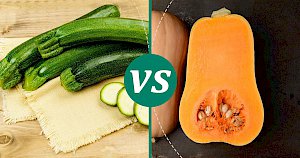Butternut Squash vs Zucchini: Calories & Nutrition Showdown


Butternut squash vs Zucchini
Nutrition Facts
Serving size:
change
5g10g15g20g30g40g50g60g80g100g120g140g160g180g200g220g250g300g350g400g450g500g600g700g800g900g1000g
1oz2oz3oz4oz5oz6oz7oz8oz10oz12oz15oz20oz25oz30oz35oz40oz50oz
Amount Per Serving:
Serving size:
change
5g10g15g20g30g40g50g60g80g100g120g140g160g180g200g220g250g300g350g400g450g500g600g700g800g900g1000g
1oz2oz3oz4oz5oz6oz7oz8oz10oz12oz15oz20oz25oz30oz35oz40oz50oz
Amount Per Serving:
Butternut Squash vs Zucchini 100g Compare
| per 100g | Butternut squash | Zucchini |
|---|---|---|
| Calories | 45 | 17 |
| Carbohydrates | 11.69 g | 3.11 g |
| Fat | 0.1 g | 0.32 g |
| Dietary fiber | 2 g | 1 g |
| Protein | 1 g | 1.21 g |
| Calcium | 48 mg | 16 mg |
| Iron | 0.7 mg | 0.37 mg |
| Magnessium | 34 mg | 18 mg |
| Phosphorus | 33 mg | 38 mg |
| Potassium | 352 mg | 261 mg |
| Sodium | 4 mg | 8 mg |
| Zink | 0.15 mg | 0.32 mg |
| Vitaminium A | 10630 µg | 200 µg |
| Vitaminium B1 (Thiamine) | 0.1 mg | 0.045 mg |
| Vitaminium B2 (riboflavin) | 0.02 mg | 0.094 mg |
| Vitaminium B3 (Niacin) | 1.2 mg | 0.451 mg |
| Vitaminium B5 | 0.4 mg | 0.204 mg |
| Vitaminium B6 | 0.154 mg | 0.163 mg |
| Vitaminium B9 (Folic acid) | 27 mg | 24 mg |
| Vitaminium C | 21 mg | 17.9 mg |
| Vitaminium E | 1.44 mg | 0.12 mg |
| Vitaminium K | 1.1 µg | 4.3 µg |
| Beta karoten | 4226 mg | 120 mg |
Discovering the Nutritional Gems: Butternut Squash and Zucchini
When it comes to selecting vegetables for your diet, the vast array of options can be truly astounding. Two popular choices, butternut squash and zucchini, are not only versatile in the kitchen but also packed with nutrients. Before we dive into the Butternut squash vs Zucchini calories and nutritional showdown, let's explore some fascinating facts about these two vegetables.
Butternut squash, with its sweet and nutty flavor, is a winter squash that belongs to the gourd family. It's known for its pear-shaped appearance and smooth, creamy-colored skin. On the other hand, Zucchini, also known as courgette, is a summer squash with a light green skin and a slightly bitter, yet fresh flavor. Both vegetables are incredibly flexible in culinary uses, from soups and salads to baked goods and side dishes.
Zucchini vs Butternut Squash: Nutritional Overview
When comparing Butternut squash vs Zucchini nutrition, it's clear that both vegetables offer unique health benefits. Here's a breakdown of their nutritional content per 100g serving:
- Calories: Butternut squash has 45 calories, while Zucchini has only 17.
- Carbohydrates: Butternut squash contains 11.69g, whereas Zucchini has 3.11g.
- Fiber: Both vegetables are good sources of fiber, with Butternut squash providing 2g and Zucchini 1g.
- Fat: Zucchini contains slightly more fat (0.32g) compared to Butternut squash (0.1g).
- Protein: Zucchini edges out with 1.21g of protein, compared to Butternut squash's 1g.
Additionally, Butternut squash is a powerhouse of vitamins and minerals, notably high in Vitamin A (10630 IU), which is essential for eye health, and offering a good amount of Vitamin C, calcium, and magnesium. Zucchini, while lower in calories and carbs, provides valuable nutrients as well, including Vitamin C, potassium, and Vitamin B6.
Comparing the Benefits: Zucchini vs Butternut Squash
Understanding the Zucchini vs Butternut squash compare in terms of health benefits can help you make informed choices based on your dietary needs. Butternut squash, with its higher calorie and carb content, is an excellent energy source. It's also rich in dietary fiber, which aids in digestion and promotes a feeling of fullness, making it a great option for weight management.
Zucchini, being low in calories and high in water content, is perfect for those looking to lose weight or maintain a healthy weight. Its skin is rich in dietary fiber, which can help to reduce constipation and offers protection against colon cancers.
Both vegetables are cholesterol-free and contain antioxidants that can help reduce the risk of certain diseases, including heart disease and certain cancers. They also provide a good amount of potassium, which is important for maintaining healthy blood pressure levels.
Conclusion: A Place for Both on Your Plate
In the debate of Butternut squash vs Zucchini, it's clear that both vegetables offer significant nutritional benefits and can be excellent additions to a healthy diet. Whether you're looking for a low-calorie option like Zucchini or a nutrient-dense choice like Butternut squash, incorporating these vegetables into your meals can contribute to a balanced and varied diet.
Remember, the key to a healthy diet is diversity, so why not enjoy both? Experiment with recipes that include both butternut squash and zucchini to reap the full range of nutritional benefits and flavors these vegetables have to offer.
Butternut squash 100g
45kcalCalories source
- 91% CARBS.
- 8% PROTEIN
- 2% FAT
Zucchini 100g
17kcalCalories source
- 62% CARBS
- 24% PROTEIN
- 14% FAT
Compares of butternut squash
- Butternut Squash vs Artichoke
- Butternut Squash vs Asparagus
- Butternut Squash vs Beetroot
- Butternut Squash vs Calabash
- Butternut Squash vs Broccoli
- Butternut Squash vs Cabbage
- see all compares of butternut squash
Compares of zucchini
Read also:
- Calories from Butternut squash
- Calories of Cabbage
- Calories in Carrot
- Cassava calories per 100g
- Cauliflower protein per 100g
- How many calories does fodder cabbage have?
- Calories in a half of eggplant
- Calories in whole eggplant
- Calories for one, two or more eggplants
- Calories in slice of eggplant
- How much protein in endive?
Marcin Piotrowicz
calories-info.com creator
Healthy diet and healthy lifestyle promoter
Add comment